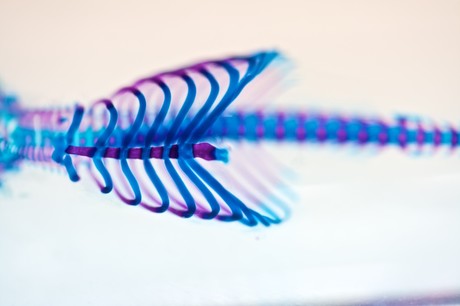3D-printed sternum successfully implanted

A collaboration between CSIRO, Melbourne medical implant company Anatomics and British doctors has resulted in the world’s first implementation of a 3D-printed titanium and polymer sternum into a patient.
Designed by Anatomics and printed at CSIRO’s Lab 22 facility in Melbourne, the implant was custom made for 61-year-old Edward Evans, who had previously had his sternum removed due to a rare infection. While Evans recovered well from this initial surgery, the absence of a solid sternum meant that his heart and lungs were left extremely vulnerable.
Sternum implants are typically made from a hand-moulded cement block wedged in a synthetic mesh, but doctors have been searching for a better, more modern alternative. Evans’ surgeon found this alternative by contacting Anatomics, which is a world leader in the design and manufacture of bespoke surgical implants.
Anatomics designed a sternum featuring titanium — a strong, lightweight, biologically compatible metal that is not rejected in human bodies. The company’s designs were then sent to CSIRO, where they were fed into a 3D printer full of powdered titanium. The particles were fused together layer by layer by an electron beam until a sternum had been printed that would precisely fill the defect in Evans’ chest.
The printed sternum was returned to Anatomics for processing and cleaning and was coated in porous polyethylene — a substance manufactured to create a bone-like porous architecture and which also helps with tissue adhesion. Finally, the implant was sterilised and shipped to the UK for surgery.
The operation marked the first time a titanium sternum combined with a synthetic polymer has been used to replace bone, cartilage and tissue in a patient. Evans has since made a successful recovery, with motion capture tests finding that his breathing and chest movements have been corrected.
Babies of stressed mothers likely to get their teeth earlier
Maternal stress during pregnancy can speed up the timing of teeth eruption, which may be an early...
Customised immune cells used to fight brain cancer
Researchers have developed CAR-T cells — ie, genetically modified immune cells manufactured...
Elevated blood protein levels predict mortality
Proteins that play key roles in the development of diseases such as cancer and inflammation may...





